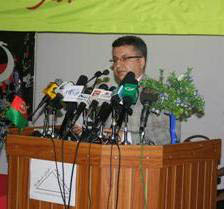Why did CSHRN choose Herat city to work on reducing family violence?
By Malek Sitez This question has been raised many times since CSHRN started to work on organizing a campaign to reduce family violence in Herat city. A lawyer, who is responsible for the ministry of justice in Herat, asked this question during the human rights symposium in Herat. This question is understandable as violence is not only an issue in Herat but in all of Afghanistan. Afghanistan has been suffering from domestic violence for many years, in particular since 1992 when the civil war and sectarian conflicts began. To explain the reasons I need to divide my article into two parts, describing the problems as well as the opportunities existing in Herat city regarding family violence. At the end of this article I will draw a picture of the current work of CSHRN in the region. Problems: Islamic fanatics and their bad influence on family violence. Between 1994 and 1996 Herat became one the most important targets of Islamic fundamentalists and Taliban. The Taliban captured Herat city after Qhandahar. During the Taliban period, the people of Herat, above all women and children, badly suffered from a lack of fundamental freedoms. The role of women became a very passive one and man's domination in families reached a very high level. This unbalanced role of men and women turned into an important reason for family violence in Herat. Bad and incorrect interpretation of Islamic values regarding the role of women. The fanatic Taliban and Mujahedin parties misinterpreted Islam for the sake of their strategy and ideology, particularly with regard to the role of women in society. They wanted to show that women were a passive part of the Herat society, destined to serve men. “It is big shame to respect women!” This culture does not only predominate in Herat, but…
